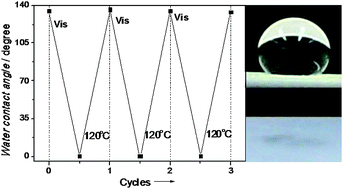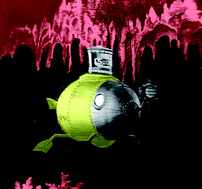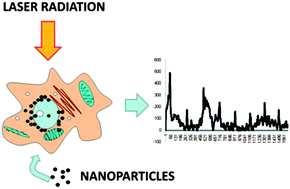
Junwei Wang, Baodong Mao, James L. Gole and Clemens Burda
Nanoscale, 2010, Advance Article, DOI: 10.1039/C0NR00313A
Read this and more Nanoscale Avanced Articles

Junwei Wang, Baodong Mao, James L. Gole and Clemens Burda
Nanoscale, 2010, Advance Article, DOI: 10.1039/C0NR00313A
Read this and more Nanoscale Avanced Articles
Nanoscale Feature Article: out now
Signal transmission, conversion and multiplication by polar molecules confined in nanochannels
Yusong Tu, Ruhong Zhou and Haiping Fang
Nanoscale, 2010, Advance Article, DOI: 10.1039/C0NR00304B
Review on recent progress on the signal transduction mediated by water and other polar molecules confined in nanochannels. These studies might have significance in future designs and applications of nanoscale electronic devices, and might also provide useful insights for a better understanding of signal conduction in both physical and biological systems.
Interested? Read it now
Jessica M. Rosenholm, Cecilia Sahlgren and Mika Lindén
Nanoscale, 2010, Advance Article, DOI: 10.1039/C0NR00156B
Read this Hot Review now
See more Nanoscale Advanced Articles
HOT Nanoscale paper – read it for free…
Controllable reflection properties of nanocomposite photonic crystals constructed by semiconductor nanocrystallites and natural periodic bio-matrices
Jie Han, Huilan Su, Fang Song, Di Zhang and Zhixin Chen
Nanoscale, 2010, DOI: 10.1039/C0NR00103A
The subtle periodic nanostructures in butterfly wings and peacock feathers are applied as natural PhC matrices to in situ embed CdS nanocrystallites (nano-CdS) on the structure surface via a convenient solution process. The resulting nano-CdS/natural PhCs nanocomposites show typical 1D, quasi 1D and 2D PhC structures at the nanoscale, which is inherited from the corresponding natural periodic bio-matrices.
This work suggests that natural periodic bio-structures could be perfect matrices to construct novel nanocomposite PhCs, whose photonic band structures are tunable and thus achieve controllable optical properties. Related ideas could inspire the design and synthesis of future nanocomposite PhCs.
Read this FREE ‘HOT’ review article by Thomas J. Meade and colleagues on magnetic resonance imaging (MRI) probes on the nanoscale:
High-performance nanostructured MR contrast probes
Fengqin Hu, Hrushikesh M. Joshi, Vinayak P. Dravid and Thomas J. Meade
Nanoscale, 2010, DOI: 10.1039/C0NR00173B
Nanoscale Communication article hot off the press – read it now for free:
ZnS nano-architectures: photocatalysis, deactivation and regeneration
Dagui Chen, Feng Huang, Guoqiang Ren, Dongsong Li, Meng Zheng, Yongjing Wang and Zhang Lin
Nanoscale, 2010, DOI: 10.1039/C0NR00171F
Zhang Lin and colleagues show an “infinite recycling” method for enhancing the durable applications of a ZnS nano-photocatalyst.
They design a strategy in which the deactivated ZnS nano-photocatalyst could be recovered into its original state, which can be used repeatedly without being released into environment as nano-waste.
Nanoscale Minireview – read this for FREE now!
Electrochemically powered self-propelled electrophoretic nanosubmarines
Martin Pumera
Nanoscale, 2010, DOI: 10.1039/C0NR00287A

These nanomachines are self-powered, taking energy from their environment by electrocatalytic conversion of chemicals present in the solution, self-propelled by flux of the electrons within the submarine and the hydronium ions on the surface of the nanosub, powering it in the direction opposite to that of the flux of the hydronium. These nanosubmarines are responsive to external fields, able to follow complex magnetic patterns, navigate themselves in complex microfluidic channels, follow chemical gradients, carry cargo, and communicate with each other.
Read for free this review on recent advances in single nanoparticles spectroscopy by Abhijit Biswas and colleagues:

Abhijit Biswas, Tao Wang and Alexandru S. Biris
Nanoscale, 2010, DOI: 10.1039/c0nr00133c
This paper reviews recent advances in single nanoparticles spectroscopy using both near-field and far-field optics. It covers spectroscopy methods for extremely small ( 1 nm) to relatively large nanoparticles ( 200 nm) and their optical properties. Different optical techniques are described. Finally, a perspective on possible practical applications of single nanoparticle spectroscopy focusing on biomedical fields is given.
Piero Baglioni and colleagues at the University of Florence in Italy, have developed a novel nanofluid system that removes damaging coatings from wall paintings.
Read this article for free now:
Removal of acrylic coatings from works of art by means of nanofluids: understanding the mechanism at the nanoscale
Michele Baglioni, Doris Rengstl, Debora Berti, Massimo Bonini, Rodorico Giorgi and Piero Baglioni, Nanoscale, 2010,
DOI: 10.1039/c0nr00255k

They have used a novel system composed of water, SDS, 1-pentanol, ethyl acetate and propylene carbonate was recently formulated and successfully used to remove acrylic and vinyl/acrylic copolymers from Mesoamerican wall paintings in the archeological site of Cholula, Mexico.